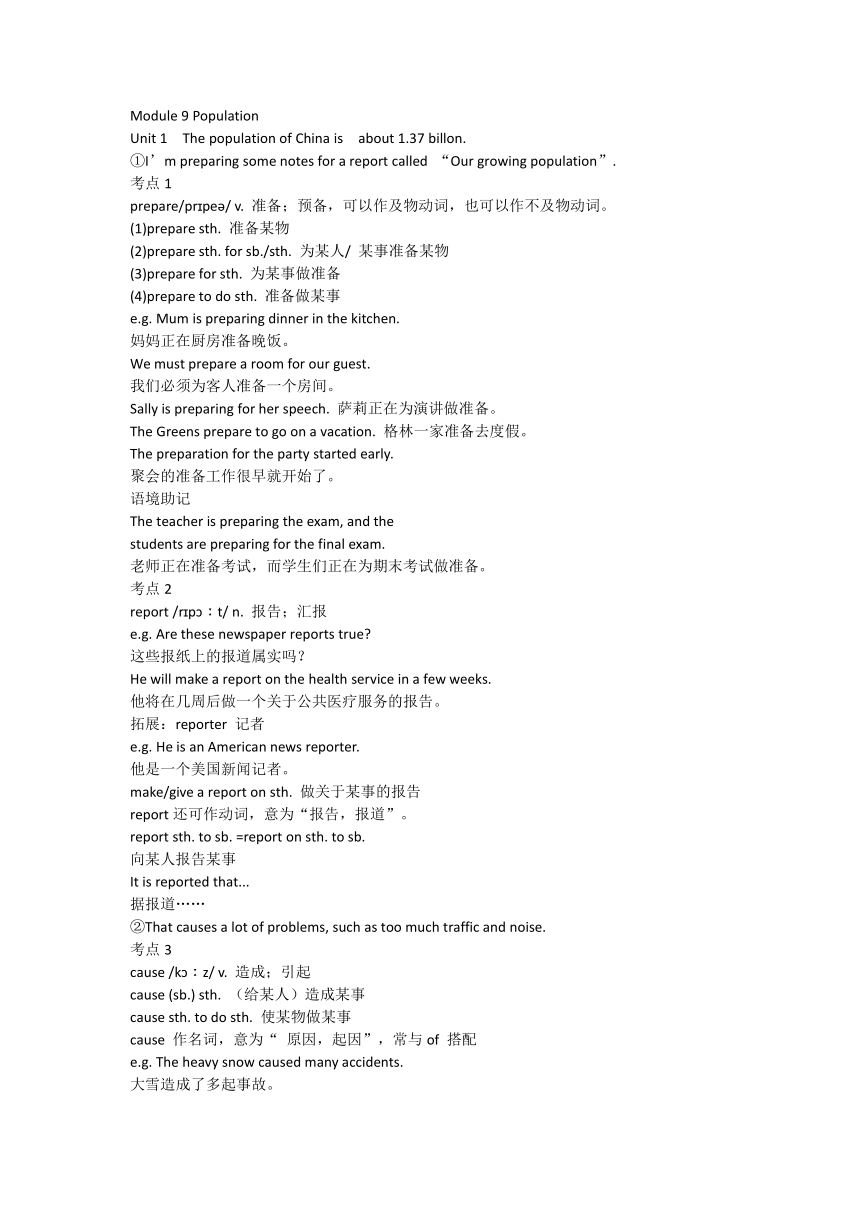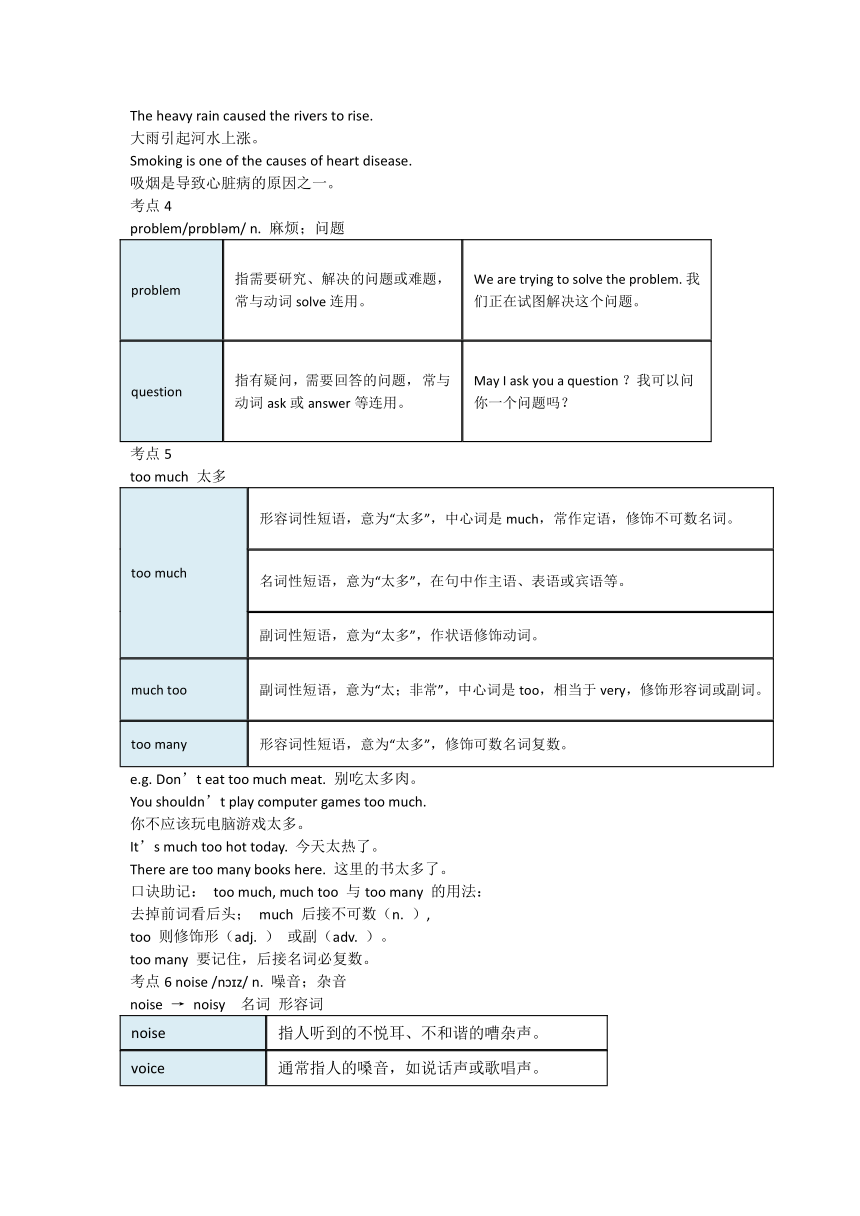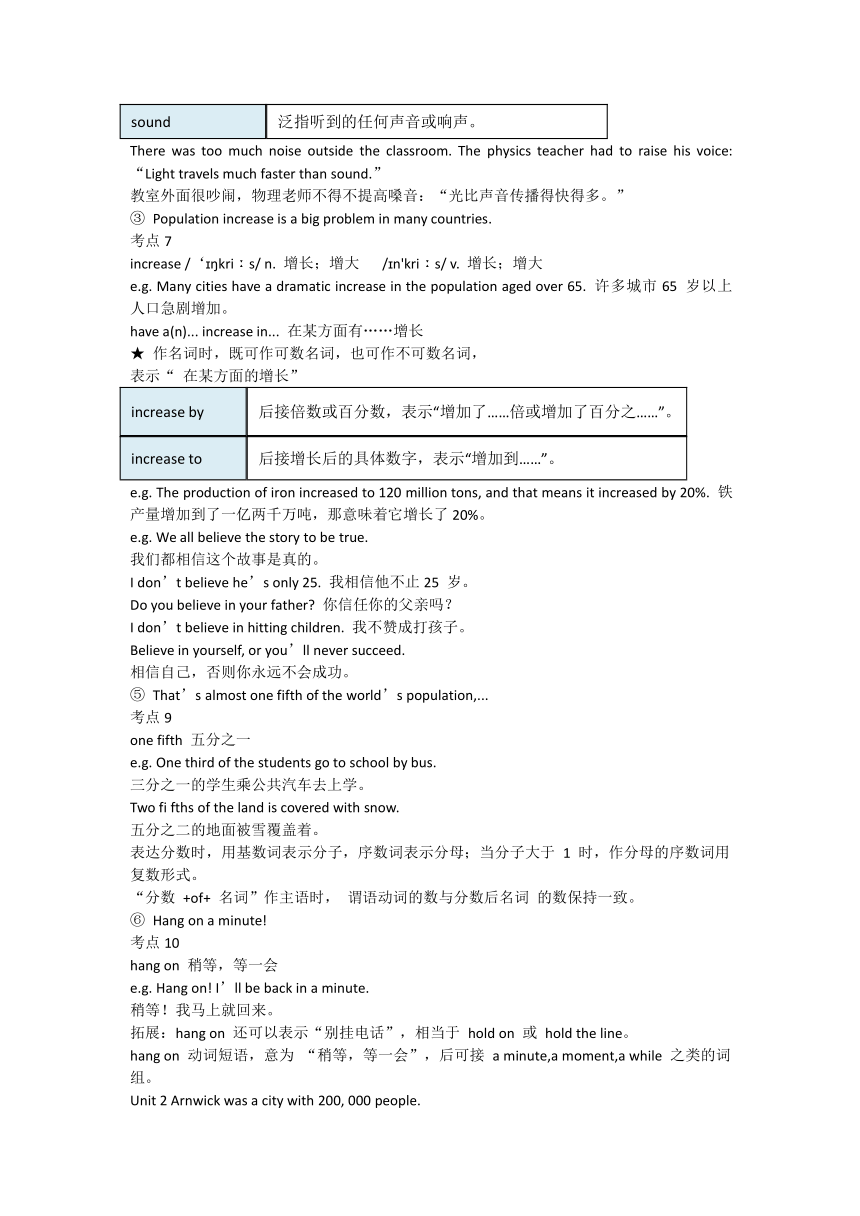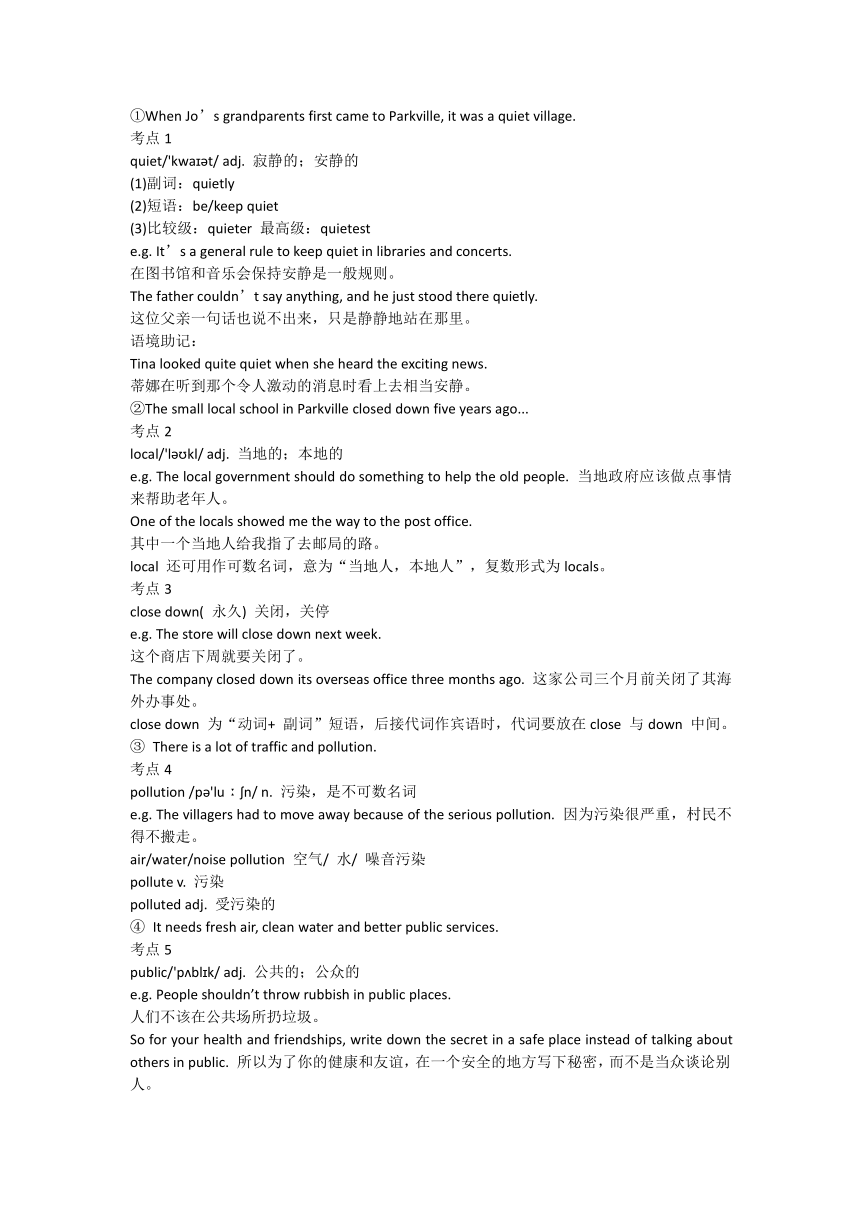Module 9 Population 知识点讲义
文档属性
| 名称 | Module 9 Population 知识点讲义 |

|
|
| 格式 | docx | ||
| 文件大小 | 31.7KB | ||
| 资源类型 | 教案 | ||
| 版本资源 | 外研版 | ||
| 科目 | 英语 | ||
| 更新时间 | 2023-09-09 07:09:32 | ||
图片预览




文档简介
Module 9 Population
Unit 1 The population of China is about 1.37 billon.
①I’m preparing some notes for a report called “Our growing population”.
考点1
prepare/pr pe / v. 准备;预备,可以作及物动词,也可以作不及物动词。
(1)prepare sth. 准备某物
(2)prepare sth. for sb./sth. 为某人/ 某事准备某物
(3)prepare for sth. 为某事做准备
(4)prepare to do sth. 准备做某事
e.g. Mum is preparing dinner in the kitchen.
妈妈正在厨房准备晚饭。
We must prepare a room for our guest.
我们必须为客人准备一个房间。
Sally is preparing for her speech. 萨莉正在为演讲做准备。
The Greens prepare to go on a vacation. 格林一家准备去度假。
The preparation for the party started early.
聚会的准备工作很早就开始了。
语境助记
The teacher is preparing the exam, and the
students are preparing for the final exam.
老师正在准备考试,而学生们正在为期末考试做准备。
考点2
report /r p t/ n. 报告;汇报
e.g. Are these newspaper reports true
这些报纸上的报道属实吗?
He will make a report on the health service in a few weeks.
他将在几周后做一个关于公共医疗服务的报告。
拓展:reporter 记者
e.g. He is an American news reporter.
他是一个美国新闻记者。
make/give a report on sth. 做关于某事的报告
report还可作动词,意为“报告,报道”。
report sth. to sb. =report on sth. to sb.
向某人报告某事
It is reported that...
据报道……
②That causes a lot of problems, such as too much traffic and noise.
考点3
cause /k z/ v. 造成;引起
cause (sb.) sth. (给某人)造成某事
cause sth. to do sth. 使某物做某事
cause 作名词,意为“ 原因,起因”,常与of 搭配
e.g. The heavy snow caused many accidents.
大雪造成了多起事故。
The heavy rain caused the rivers to rise.
大雨引起河水上涨。
Smoking is one of the causes of heart disease.
吸烟是导致心脏病的原因之一。
考点4
problem/pr bl m/ n. 麻烦;问题
problem 指需要研究、解决的问题或难题,常与动词solve 连用。 We are trying to solve the problem. 我们正在试图解决这个问题。
question 指有疑问,需要回答的问题, 常与动词ask或answer等连用。 May I ask you a question ?我可以问你一个问题吗?
考点5
too much 太多
too much 形容词性短语,意为“太多”,中心词是much,常作定语,修饰不可数名词。
名词性短语,意为“太多”,在句中作主语、表语或宾语等。
副词性短语,意为“太多”,作状语修饰动词。
much too 副词性短语,意为“太;非常”,中心词是too,相当于very,修饰形容词或副词。
too many 形容词性短语,意为“太多”,修饰可数名词复数。
e.g. Don’t eat too much meat. 别吃太多肉。
You shouldn’t play computer games too much.
你不应该玩电脑游戏太多。
It’s much too hot today. 今天太热了。
There are too many books here. 这里的书太多了。
口诀助记: too much, much too 与too many 的用法:
去掉前词看后头; much 后接不可数(n. ),
too 则修饰形(adj. ) 或副(adv. )。
too many 要记住,后接名词必复数。
考点6 noise /n z/ n. 噪音;杂音
noise → noisy 名词 形容词
noise 指人听到的不悦耳、不和谐的嘈杂声。
voice 通常指人的嗓音,如说话声或歌唱声。
sound 泛指听到的任何声音或响声。
There was too much noise outside the classroom. The physics teacher had to raise his voice: “Light travels much faster than sound.”
教室外面很吵闹,物理老师不得不提高嗓音:“光比声音传播得快得多。”
③ Population increase is a big problem in many countries.
考点7
increase /‘ kri s/ n. 增长;增大 / n'kri s/ v. 增长;增大
e.g. Many cities have a dramatic increase in the population aged over 65. 许多城市65 岁以上人口急剧增加。
have a(n)... increase in... 在某方面有……增长
★ 作名词时,既可作可数名词,也可作不可数名词,
表示“ 在某方面的增长”
increase by 后接倍数或百分数,表示“增加了……倍或增加了百分之……”。
increase to 后接增长后的具体数字,表示“增加到……”。
e.g. The production of iron increased to 120 million tons, and that means it increased by 20%. 铁产量增加到了一亿两千万吨,那意味着它增长了20%。
e.g. We all believe the story to be true.
我们都相信这个故事是真的。
I don’t believe he’s only 25. 我相信他不止25 岁。
Do you believe in your father 你信任你的父亲吗?
I don’t believe in hitting children. 我不赞成打孩子。
Believe in yourself, or you’ll never succeed.
相信自己,否则你永远不会成功。
⑤ That’s almost one fifth of the world’s population,...
考点9
one fifth 五分之一
e.g. One third of the students go to school by bus.
三分之一的学生乘公共汽车去上学。
Two fi fths of the land is covered with snow.
五分之二的地面被雪覆盖着。
表达分数时,用基数词表示分子,序数词表示分母;当分子大于 1 时,作分母的序数词用复数形式。
“分数 +of+ 名词”作主语时, 谓语动词的数与分数后名词 的数保持一致。
⑥ Hang on a minute!
考点10
hang on 稍等,等一会
e.g. Hang on! I’ll be back in a minute.
稍等!我马上就回来。
拓展:hang on 还可以表示“别挂电话”,相当于 hold on 或 hold the line。
hang on 动词短语,意为 “稍等,等一会”,后可接 a minute,a moment,a while 之类的词组。
Unit 2 Arnwick was a city with 200, 000 people.
①When Jo’s grandparents first came to Parkville, it was a quiet village.
考点1
quiet/'kwa t/ adj. 寂静的;安静的
(1)副词:quietly
(2)短语:be/keep quiet
(3)比较级:quieter 最高级:quietest
e.g. It’s a general rule to keep quiet in libraries and concerts.
在图书馆和音乐会保持安静是一般规则。
The father couldn’t say anything, and he just stood there quietly.
这位父亲一句话也说不出来,只是静静地站在那里。
语境助记:
Tina looked quite quiet when she heard the exciting news.
蒂娜在听到那个令人激动的消息时看上去相当安静。
②The small local school in Parkville closed down five years ago...
考点2
local/'l kl/ adj. 当地的;本地的
e.g. The local government should do something to help the old people. 当地政府应该做点事情来帮助老年人。
One of the locals showed me the way to the post office.
其中一个当地人给我指了去邮局的路。
local 还可用作可数名词,意为“当地人,本地人”,复数形式为locals。
考点3
close down( 永久) 关闭,关停
e.g. The store will close down next week.
这个商店下周就要关闭了。
The company closed down its overseas office three months ago. 这家公司三个月前关闭了其海外办事处。
close down 为“动词+ 副词”短语,后接代词作宾语时,代词要放在close 与down 中间。
③ There is a lot of traffic and pollution.
考点4
pollution /p 'lu n/ n. 污染,是不可数名词
e.g. The villagers had to move away because of the serious pollution. 因为污染很严重,村民不得不搬走。
air/water/noise pollution 空气/ 水/ 噪音污染
pollute v. 污染
polluted adj. 受污染的
④ It needs fresh air, clean water and better public services.
考点5
public/'p bl k/ adj. 公共的;公众的
e.g. People shouldn’t throw rubbish in public places.
人们不该在公共场所扔垃圾。
So for your health and friendships, write down the secret in a safe place instead of talking about others in public. 所以为了你的健康和友谊,在一个安全的地方写下秘密,而不是当众谈论别人。
public 的用法
形容词,意为“公共的;公众的” in public places 在公共场所
名词,常用短语 in public“当众,公开”
小贴士:
the public 意 为“大众,公众”。作主语侧重整体A时,谓语动词用单数;侧重每一个具体成员时,谓语动词用复数。
考点6
service /'s v s/ n. 公共服务;服务
e.g. The government tries to improve public services, especially education.
政府尽力改善公共服务事业,尤其是教育。
The food was good but the service was bad.
饭菜不错,但服务差劲。
拓展: serve 作动词,意为“(给……)提供;服务”。
★语境助记:
The young man is serving the guests dishes. The guests are satisfied with his service.
这个年轻人正在给客人们上菜。客人们对他的服务很满意。
⑤ However, can money help solve all these problems
考点7
solve/'s lv/ v. 解决问题
e.g. There’s no simple solution to this problem.
这个问题没有简单的解决办法。
solve 作动词时,常与problem 连用。它的名词是solution,意为“解决办法”。
Unit 3Language in use
① Mina is an eighteen-year-old girl.
考点1
eighteen-year-old 十八岁的
e.g. He is ten years old. 他十岁了。
He is a ten-year-old boy. 他是一个十岁的男孩。
a three-week holiday 一个为期三周的假期
“数词+名词+形容词”中形容词通常为long,wide,tall,old,deep 等。
“数词+ 名词”也可以表示复合形容词。
②... we are working to make them even better.
考点2
even/'i vn/ adv. 还,甚至更
e.g. You know even less about it than I do.
你对此事的了解甚至还不如我。
It is cold there even in summer.
那儿即使夏天也是寒冷的。
放在比较级前,用来表示程度,加强比较。even 作副词,还可意为“甚至,连,即使”,用于强调出乎意料。
③There is so much traffic on the roads that in some cities the air is heavily polluted.
考点3
so...that... 如此……以至于……
① so + many/much/few/ little+ 名词+that...
② so + adj. /adv. +that...
③ so + adj. +a/an+ 可数名词单数+that...
e.g. There was so much snow on the road that the cars couldn’t move fast. 路上雪太多,汽车难以跑快。
He runs so fast that we can’t catch up with him.
他跑得太快,我们赶不上他。
It is so heavy a box that I can’t lift it.
这个箱子太重了,我提不起来。
④As a result, getting good, clean water is becoming a problem in many places.
考点4
as a result 意为“结果,因此”,为固定短语,其后通常用逗号与后面的句子隔开。
as a result of 意为“因为,由于”,为介词短语,后接名词、代词和动词的-ing 形式,相当于because of。
e.g. All singers kept together. As a result, their performance was very successful.
所有的歌手协调一致,结果他们的演出非常成功。
He was late as a result of the heavy snow.
由于大雪他迟到了。
⑤More than 3.4 million people die each year from drinking and washing with polluted water.
考点5
die from 死于……
e.g. The old man died of cancer. 这位老人死于癌症。
Many people died from the earthquake.
许多人死于那场地震。
不同的死因
die of 多指死于内部疾病等自身原因
die from多指死于外因, 主要指事故等方面的外部原因
冠词
考点1
定冠词的基本用法
(1) 表示上文提到过的人或事物
e.g. I have a book, and the book is written by Mo Yan.
我有一本书,这本书是莫言写的。
(2) 用于说话人和听话人都知道的人或物
e.g. Do you know the boy under the tree
你认识那个在树下的男孩吗?
(3) 用于指世界上独一无二的事物
e.g. the earth 地 球,the sun 太 阳,the moon 月亮
(4) 用于表示方位的名词前面
e.g. in the front of 在 ……前面,in the east 在东方,on the left 在左边
(5) 用于序数词或形容词最高级前
e.g. He is the first student to get to the school.
他是第一个到达学校的学生。
He is the tallest student in his class.
他是班里最高的学生。
(6) 用于普通名词构成的专有名词前
e.g. the Great Wall 长城
(7) 用于形容词前,表示一类人或物
e.g. We should help the old. 我们应该帮助老人。
(8) 用于江河、海洋、海峡、山脉、群岛、建筑物等名词前
e.g. the Changjiang River 长江,the Pacific Ocean 太平洋
(9) 用于姓氏复数形式前,表示“一家人”或“夫妇两人”
e.g. The Greens are having dinner.格林一家人正在吃晚饭。
(10) 用于乐器类名词前
e.g. I like playing the piano.我喜欢弹钢琴。
(11) in + the + 年份复数形式,表示“在多少世纪多少年代”
e.g. This story happened in the 1920s.
这个故事发生在 20 世纪 20 年代。
(12) 用在一些固定短语中
e.g. in the morning 在 早晨;in the end 最后;
by the way 顺便提一下;at the same time 同时
考点2
不定冠词的基本用法
(1) 泛指人或事物的某一种类
e.g. A plane is a machine that can fly.
飞机是一种可以飞行的机器。
I want to be a teacher. 我想成为一名教师。
(2) 指某一人或事物,但不具体说明
e.g. He is a teacher in our school.
他是我们学校的一名老师。
(3) 用于一些表示重量、长度、时间等的单位名词前,表示“每一”
e.g. I go shopping once a week. 我一周去购物一次。
(4) 表数量,相当于 one,但语气较弱,或表示任何一个
e.g. My father bought me a new bike.
我爸爸给我买了一辆新自行车。
(5) 使抽象名词具体化
e.g. She is a beauty. 她是个美人儿。
(6) 在一些固定搭配中
e.g. a little 一点;a few 一些;have a look 看一看;
have a good time 玩得开心
小贴士:
可数名词单数前用 a 还是 an, 根据读音,而不是字母。a 用在以辅音音素开头的单词前,如 a city, a university; an 用在以元音音素开头的单词前,如 an honest boy。
考点3
零冠词的基本用法
(1) 表示泛指、种类的复数名词之前
e.g. I like animals. 我喜欢动物。
(2) 不含普通名词的专有名词前
e.g. Mary is from America.玛丽来自美国。
(3) 名词前有指示代词、物主代词、或名词所有格修饰时
e.g. This is my pen. 这是我的钢笔。
(4) 季节、月份、星期等名词前一般不用冠词
e.g. I usually go camping in spring. 春天我通常去野营。
(5) 称呼用语前不用冠词
e.g. What’s the matter, Mom 怎么了,妈妈?
(6) 一日三餐前不用冠词
e.g. He didn’t have breakfast this morning.
他今天早上没吃早餐。
(7) 球类运动和棋类的名词前不用冠词
e.g. My father likes playing chess. 我父亲喜欢下棋。
(8) 在一些成对出现的词语前不用冠词
e.g. I like eating fruit and vegetables. 我喜欢吃水果和蔬菜。
(9) 一些名词前不加冠词表示有特定的意义
e.g. go to school 去上学,go to the school 去那所学校,
go to hospital 去医院看病,go to the hospital 去那所医院 (不一定看病 ) 类似的有 bed, table, class, university 等。
数词
考点1
基数词表达法
范围 特点 例词
1 ~ 12 无规律 one, two, three, four, five, six, seven, eight, nine, ten, eleven, twelve
13 ~ 19 以 -teen结尾 thirteen, fourteen, fif-teen, sixteen, seventeen, eighteen, nineteen
20 ~ 90之间的整十数 以 -ty 结尾 twenty, thirty, forty, fifty, sixty, seventy, eighty, ninety
21 ~ 99之间的两位数( 整十位除外 ) 十位与个位之间 要加连字符“-” twenty-five, ninety-nine
101~ 999 百位和十位之间 通常用 and 连接 one hundred and eleven
千以上 从后向前每三位加 一 个 逗 号,第 一 个 逗 号 读thousand, 第 二个读 million,第三 个 读 billion,然后一节一节读 four thousand two hundred and fifty-five (4,255)
考点2
序数词表达法
范围 特点 例词
1、2、3 无规律 first, second, third
4 ~ 19 一般在基数词后加 -th fourth, fifth, eighth, ninth, twelfth, nineteenth
20 ~ 90 整十数 把基数词后的-y变成-ie,再加 -th twentieth, ninetieth
21 及 其后 的 两位数 个位数用序数 词,十位数用基数词 21st: twenty-fi rst, 65th: sixty-fifth
考向
序数词前出现不定冠词时,表示“又一,再一”的意思。
e.g. I have tried it three times. Can I try a fourth time
我已经试了三次。我可以再试第四次吗?
考点3
分数表达法巧记
1/2: a half/one half
1/4: a fourth/one fourth/a quarter/one quarter
3/4: three quarters/three fourths
Unit 1 The population of China is about 1.37 billon.
①I’m preparing some notes for a report called “Our growing population”.
考点1
prepare/pr pe / v. 准备;预备,可以作及物动词,也可以作不及物动词。
(1)prepare sth. 准备某物
(2)prepare sth. for sb./sth. 为某人/ 某事准备某物
(3)prepare for sth. 为某事做准备
(4)prepare to do sth. 准备做某事
e.g. Mum is preparing dinner in the kitchen.
妈妈正在厨房准备晚饭。
We must prepare a room for our guest.
我们必须为客人准备一个房间。
Sally is preparing for her speech. 萨莉正在为演讲做准备。
The Greens prepare to go on a vacation. 格林一家准备去度假。
The preparation for the party started early.
聚会的准备工作很早就开始了。
语境助记
The teacher is preparing the exam, and the
students are preparing for the final exam.
老师正在准备考试,而学生们正在为期末考试做准备。
考点2
report /r p t/ n. 报告;汇报
e.g. Are these newspaper reports true
这些报纸上的报道属实吗?
He will make a report on the health service in a few weeks.
他将在几周后做一个关于公共医疗服务的报告。
拓展:reporter 记者
e.g. He is an American news reporter.
他是一个美国新闻记者。
make/give a report on sth. 做关于某事的报告
report还可作动词,意为“报告,报道”。
report sth. to sb. =report on sth. to sb.
向某人报告某事
It is reported that...
据报道……
②That causes a lot of problems, such as too much traffic and noise.
考点3
cause /k z/ v. 造成;引起
cause (sb.) sth. (给某人)造成某事
cause sth. to do sth. 使某物做某事
cause 作名词,意为“ 原因,起因”,常与of 搭配
e.g. The heavy snow caused many accidents.
大雪造成了多起事故。
The heavy rain caused the rivers to rise.
大雨引起河水上涨。
Smoking is one of the causes of heart disease.
吸烟是导致心脏病的原因之一。
考点4
problem/pr bl m/ n. 麻烦;问题
problem 指需要研究、解决的问题或难题,常与动词solve 连用。 We are trying to solve the problem. 我们正在试图解决这个问题。
question 指有疑问,需要回答的问题, 常与动词ask或answer等连用。 May I ask you a question ?我可以问你一个问题吗?
考点5
too much 太多
too much 形容词性短语,意为“太多”,中心词是much,常作定语,修饰不可数名词。
名词性短语,意为“太多”,在句中作主语、表语或宾语等。
副词性短语,意为“太多”,作状语修饰动词。
much too 副词性短语,意为“太;非常”,中心词是too,相当于very,修饰形容词或副词。
too many 形容词性短语,意为“太多”,修饰可数名词复数。
e.g. Don’t eat too much meat. 别吃太多肉。
You shouldn’t play computer games too much.
你不应该玩电脑游戏太多。
It’s much too hot today. 今天太热了。
There are too many books here. 这里的书太多了。
口诀助记: too much, much too 与too many 的用法:
去掉前词看后头; much 后接不可数(n. ),
too 则修饰形(adj. ) 或副(adv. )。
too many 要记住,后接名词必复数。
考点6 noise /n z/ n. 噪音;杂音
noise → noisy 名词 形容词
noise 指人听到的不悦耳、不和谐的嘈杂声。
voice 通常指人的嗓音,如说话声或歌唱声。
sound 泛指听到的任何声音或响声。
There was too much noise outside the classroom. The physics teacher had to raise his voice: “Light travels much faster than sound.”
教室外面很吵闹,物理老师不得不提高嗓音:“光比声音传播得快得多。”
③ Population increase is a big problem in many countries.
考点7
increase /‘ kri s/ n. 增长;增大 / n'kri s/ v. 增长;增大
e.g. Many cities have a dramatic increase in the population aged over 65. 许多城市65 岁以上人口急剧增加。
have a(n)... increase in... 在某方面有……增长
★ 作名词时,既可作可数名词,也可作不可数名词,
表示“ 在某方面的增长”
increase by 后接倍数或百分数,表示“增加了……倍或增加了百分之……”。
increase to 后接增长后的具体数字,表示“增加到……”。
e.g. The production of iron increased to 120 million tons, and that means it increased by 20%. 铁产量增加到了一亿两千万吨,那意味着它增长了20%。
e.g. We all believe the story to be true.
我们都相信这个故事是真的。
I don’t believe he’s only 25. 我相信他不止25 岁。
Do you believe in your father 你信任你的父亲吗?
I don’t believe in hitting children. 我不赞成打孩子。
Believe in yourself, or you’ll never succeed.
相信自己,否则你永远不会成功。
⑤ That’s almost one fifth of the world’s population,...
考点9
one fifth 五分之一
e.g. One third of the students go to school by bus.
三分之一的学生乘公共汽车去上学。
Two fi fths of the land is covered with snow.
五分之二的地面被雪覆盖着。
表达分数时,用基数词表示分子,序数词表示分母;当分子大于 1 时,作分母的序数词用复数形式。
“分数 +of+ 名词”作主语时, 谓语动词的数与分数后名词 的数保持一致。
⑥ Hang on a minute!
考点10
hang on 稍等,等一会
e.g. Hang on! I’ll be back in a minute.
稍等!我马上就回来。
拓展:hang on 还可以表示“别挂电话”,相当于 hold on 或 hold the line。
hang on 动词短语,意为 “稍等,等一会”,后可接 a minute,a moment,a while 之类的词组。
Unit 2 Arnwick was a city with 200, 000 people.
①When Jo’s grandparents first came to Parkville, it was a quiet village.
考点1
quiet/'kwa t/ adj. 寂静的;安静的
(1)副词:quietly
(2)短语:be/keep quiet
(3)比较级:quieter 最高级:quietest
e.g. It’s a general rule to keep quiet in libraries and concerts.
在图书馆和音乐会保持安静是一般规则。
The father couldn’t say anything, and he just stood there quietly.
这位父亲一句话也说不出来,只是静静地站在那里。
语境助记:
Tina looked quite quiet when she heard the exciting news.
蒂娜在听到那个令人激动的消息时看上去相当安静。
②The small local school in Parkville closed down five years ago...
考点2
local/'l kl/ adj. 当地的;本地的
e.g. The local government should do something to help the old people. 当地政府应该做点事情来帮助老年人。
One of the locals showed me the way to the post office.
其中一个当地人给我指了去邮局的路。
local 还可用作可数名词,意为“当地人,本地人”,复数形式为locals。
考点3
close down( 永久) 关闭,关停
e.g. The store will close down next week.
这个商店下周就要关闭了。
The company closed down its overseas office three months ago. 这家公司三个月前关闭了其海外办事处。
close down 为“动词+ 副词”短语,后接代词作宾语时,代词要放在close 与down 中间。
③ There is a lot of traffic and pollution.
考点4
pollution /p 'lu n/ n. 污染,是不可数名词
e.g. The villagers had to move away because of the serious pollution. 因为污染很严重,村民不得不搬走。
air/water/noise pollution 空气/ 水/ 噪音污染
pollute v. 污染
polluted adj. 受污染的
④ It needs fresh air, clean water and better public services.
考点5
public/'p bl k/ adj. 公共的;公众的
e.g. People shouldn’t throw rubbish in public places.
人们不该在公共场所扔垃圾。
So for your health and friendships, write down the secret in a safe place instead of talking about others in public. 所以为了你的健康和友谊,在一个安全的地方写下秘密,而不是当众谈论别人。
public 的用法
形容词,意为“公共的;公众的” in public places 在公共场所
名词,常用短语 in public“当众,公开”
小贴士:
the public 意 为“大众,公众”。作主语侧重整体A时,谓语动词用单数;侧重每一个具体成员时,谓语动词用复数。
考点6
service /'s v s/ n. 公共服务;服务
e.g. The government tries to improve public services, especially education.
政府尽力改善公共服务事业,尤其是教育。
The food was good but the service was bad.
饭菜不错,但服务差劲。
拓展: serve 作动词,意为“(给……)提供;服务”。
★语境助记:
The young man is serving the guests dishes. The guests are satisfied with his service.
这个年轻人正在给客人们上菜。客人们对他的服务很满意。
⑤ However, can money help solve all these problems
考点7
solve/'s lv/ v. 解决问题
e.g. There’s no simple solution to this problem.
这个问题没有简单的解决办法。
solve 作动词时,常与problem 连用。它的名词是solution,意为“解决办法”。
Unit 3Language in use
① Mina is an eighteen-year-old girl.
考点1
eighteen-year-old 十八岁的
e.g. He is ten years old. 他十岁了。
He is a ten-year-old boy. 他是一个十岁的男孩。
a three-week holiday 一个为期三周的假期
“数词+名词+形容词”中形容词通常为long,wide,tall,old,deep 等。
“数词+ 名词”也可以表示复合形容词。
②... we are working to make them even better.
考点2
even/'i vn/ adv. 还,甚至更
e.g. You know even less about it than I do.
你对此事的了解甚至还不如我。
It is cold there even in summer.
那儿即使夏天也是寒冷的。
放在比较级前,用来表示程度,加强比较。even 作副词,还可意为“甚至,连,即使”,用于强调出乎意料。
③There is so much traffic on the roads that in some cities the air is heavily polluted.
考点3
so...that... 如此……以至于……
① so + many/much/few/ little+ 名词+that...
② so + adj. /adv. +that...
③ so + adj. +a/an+ 可数名词单数+that...
e.g. There was so much snow on the road that the cars couldn’t move fast. 路上雪太多,汽车难以跑快。
He runs so fast that we can’t catch up with him.
他跑得太快,我们赶不上他。
It is so heavy a box that I can’t lift it.
这个箱子太重了,我提不起来。
④As a result, getting good, clean water is becoming a problem in many places.
考点4
as a result 意为“结果,因此”,为固定短语,其后通常用逗号与后面的句子隔开。
as a result of 意为“因为,由于”,为介词短语,后接名词、代词和动词的-ing 形式,相当于because of。
e.g. All singers kept together. As a result, their performance was very successful.
所有的歌手协调一致,结果他们的演出非常成功。
He was late as a result of the heavy snow.
由于大雪他迟到了。
⑤More than 3.4 million people die each year from drinking and washing with polluted water.
考点5
die from 死于……
e.g. The old man died of cancer. 这位老人死于癌症。
Many people died from the earthquake.
许多人死于那场地震。
不同的死因
die of 多指死于内部疾病等自身原因
die from多指死于外因, 主要指事故等方面的外部原因
冠词
考点1
定冠词的基本用法
(1) 表示上文提到过的人或事物
e.g. I have a book, and the book is written by Mo Yan.
我有一本书,这本书是莫言写的。
(2) 用于说话人和听话人都知道的人或物
e.g. Do you know the boy under the tree
你认识那个在树下的男孩吗?
(3) 用于指世界上独一无二的事物
e.g. the earth 地 球,the sun 太 阳,the moon 月亮
(4) 用于表示方位的名词前面
e.g. in the front of 在 ……前面,in the east 在东方,on the left 在左边
(5) 用于序数词或形容词最高级前
e.g. He is the first student to get to the school.
他是第一个到达学校的学生。
He is the tallest student in his class.
他是班里最高的学生。
(6) 用于普通名词构成的专有名词前
e.g. the Great Wall 长城
(7) 用于形容词前,表示一类人或物
e.g. We should help the old. 我们应该帮助老人。
(8) 用于江河、海洋、海峡、山脉、群岛、建筑物等名词前
e.g. the Changjiang River 长江,the Pacific Ocean 太平洋
(9) 用于姓氏复数形式前,表示“一家人”或“夫妇两人”
e.g. The Greens are having dinner.格林一家人正在吃晚饭。
(10) 用于乐器类名词前
e.g. I like playing the piano.我喜欢弹钢琴。
(11) in + the + 年份复数形式,表示“在多少世纪多少年代”
e.g. This story happened in the 1920s.
这个故事发生在 20 世纪 20 年代。
(12) 用在一些固定短语中
e.g. in the morning 在 早晨;in the end 最后;
by the way 顺便提一下;at the same time 同时
考点2
不定冠词的基本用法
(1) 泛指人或事物的某一种类
e.g. A plane is a machine that can fly.
飞机是一种可以飞行的机器。
I want to be a teacher. 我想成为一名教师。
(2) 指某一人或事物,但不具体说明
e.g. He is a teacher in our school.
他是我们学校的一名老师。
(3) 用于一些表示重量、长度、时间等的单位名词前,表示“每一”
e.g. I go shopping once a week. 我一周去购物一次。
(4) 表数量,相当于 one,但语气较弱,或表示任何一个
e.g. My father bought me a new bike.
我爸爸给我买了一辆新自行车。
(5) 使抽象名词具体化
e.g. She is a beauty. 她是个美人儿。
(6) 在一些固定搭配中
e.g. a little 一点;a few 一些;have a look 看一看;
have a good time 玩得开心
小贴士:
可数名词单数前用 a 还是 an, 根据读音,而不是字母。a 用在以辅音音素开头的单词前,如 a city, a university; an 用在以元音音素开头的单词前,如 an honest boy。
考点3
零冠词的基本用法
(1) 表示泛指、种类的复数名词之前
e.g. I like animals. 我喜欢动物。
(2) 不含普通名词的专有名词前
e.g. Mary is from America.玛丽来自美国。
(3) 名词前有指示代词、物主代词、或名词所有格修饰时
e.g. This is my pen. 这是我的钢笔。
(4) 季节、月份、星期等名词前一般不用冠词
e.g. I usually go camping in spring. 春天我通常去野营。
(5) 称呼用语前不用冠词
e.g. What’s the matter, Mom 怎么了,妈妈?
(6) 一日三餐前不用冠词
e.g. He didn’t have breakfast this morning.
他今天早上没吃早餐。
(7) 球类运动和棋类的名词前不用冠词
e.g. My father likes playing chess. 我父亲喜欢下棋。
(8) 在一些成对出现的词语前不用冠词
e.g. I like eating fruit and vegetables. 我喜欢吃水果和蔬菜。
(9) 一些名词前不加冠词表示有特定的意义
e.g. go to school 去上学,go to the school 去那所学校,
go to hospital 去医院看病,go to the hospital 去那所医院 (不一定看病 ) 类似的有 bed, table, class, university 等。
数词
考点1
基数词表达法
范围 特点 例词
1 ~ 12 无规律 one, two, three, four, five, six, seven, eight, nine, ten, eleven, twelve
13 ~ 19 以 -teen结尾 thirteen, fourteen, fif-teen, sixteen, seventeen, eighteen, nineteen
20 ~ 90之间的整十数 以 -ty 结尾 twenty, thirty, forty, fifty, sixty, seventy, eighty, ninety
21 ~ 99之间的两位数( 整十位除外 ) 十位与个位之间 要加连字符“-” twenty-five, ninety-nine
101~ 999 百位和十位之间 通常用 and 连接 one hundred and eleven
千以上 从后向前每三位加 一 个 逗 号,第 一 个 逗 号 读thousand, 第 二个读 million,第三 个 读 billion,然后一节一节读 four thousand two hundred and fifty-five (4,255)
考点2
序数词表达法
范围 特点 例词
1、2、3 无规律 first, second, third
4 ~ 19 一般在基数词后加 -th fourth, fifth, eighth, ninth, twelfth, nineteenth
20 ~ 90 整十数 把基数词后的-y变成-ie,再加 -th twentieth, ninetieth
21 及 其后 的 两位数 个位数用序数 词,十位数用基数词 21st: twenty-fi rst, 65th: sixty-fifth
考向
序数词前出现不定冠词时,表示“又一,再一”的意思。
e.g. I have tried it three times. Can I try a fourth time
我已经试了三次。我可以再试第四次吗?
考点3
分数表达法巧记
1/2: a half/one half
1/4: a fourth/one fourth/a quarter/one quarter
3/4: three quarters/three fourths
同课章节目录
- Module 1 How to learn English
- Unit 1 Let's try to speak English as much as possi
- Unit 2 You should smile at her.
- Unit 3 Language in use .
- Module 2 My home town and my country
- Unit 1 It's taller than many other buildings.
- Unit 2 Cambridge is a beautiful city in the east o
- Unit 3 Language in use .
- Module 3 Sports.
- Unit 1 Nothing is more exciting than playing tenni
- Unit 2 This year we training more carefully.
- Unit 3 Language in use .
- Module 4 Planes, ships and trains .
- Unit 1 He lives the farthest from school.
- Unit 2 What is the best way to travel.
- Unit 3 Language in use .
- Module 5 Lao She Teahouse.
- Unit 1 I wanted to see the Beijing Opera.
- Unit 2 It descibes the changes in Chinese society.
- Unit 3 Language in use .
- Module 6 Animals in danger.
- Unit 1 It allows people to get closer to them .
- Unit 2 The WWF is working hard to save them all.
- Unit 3 Language in use .
- Revision module A
- Module 7 A famous story
- Unit 1 Alice was sitting with her sister by the ri
- Unit 2 She was thinking about her cat.
- Unit 3 Language in use .
- Module 8 Accidents
- Unit 1 While the car were changing to red, a car s
- Unit 2 I was trying to pick it up when it bite me
- Unit 3 Language in use .
- Module 9 Population
- Unit 1 The population of China is about 1.37 billi
- Unit 2 Arnwick was a city with 200,000 people.
- Unit 3 Language in use .
- Module 10 The weathe
- Unit 1 It might snow.
- Unit 2 The weather is fine all year round.
- Unit 3 Language in use .
- Module 11 Way of life
- Unit 1 In China ,we open a gift later.
- Unit 2 In England, you usually drink tea with milk
- Unit 3 Language in use .
- Module 12 Help
- Unit 1 What should we do before help arrives?
- Unit 2 Stay away from windows and heavy furniture.
- Unit 3 Language in use .
- Revision module B
